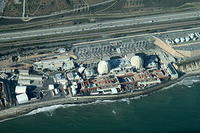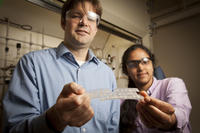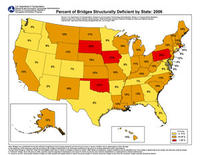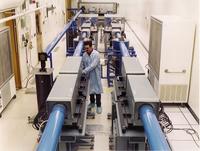-
California’s San Onofre nuclear power plant retired due to safety concerns

Southern California Edison (SCE) has decided it will retire the San Onofre nuclear power plant located on the California coast. The decision comes after officials debated for over a year whether the twin reactors could be safely restarted. The power plant is located in a populated area, with millions living near it.
-
-
Edward Snowden, an NSA contractor employee, says he is the source of NSA leaks
Edward Snowden, a 29-year-old former technical assistant in the CIA and more recently an employee of the defense contractor Booz Allen Hamilton, has identified himself as the source of the leaks about three massive NSA surveillance schemes. Snowden says the NSA’s surveillance activities are all-consuming; these activities “are intent on making every conversation and every form of behavior in the world known to [the NSA].” He said that once he concluded that the NSA’s surveillance scheme would soon be irrevocable, it was just a matter of time before he chose to act. “What they’re doing” poses “an existential threat to democracy,” he said.
-
-
Second NSA domestic surveillance scheme revealed: data mining from nine U.S. ISPs

A day after it was revealed that the NSA was collecting communication information on millions of Verizon’s U.S. customers, another NSA domestic surveillance scheme was exposed: the NSA and the FBI have been tapping directly into the central servers of nine leading U.S. Internet service providers for the purpose of harvesting audio, video, photographs, e-mails, documents, and connection logs. The information collected allowed intelligence analysts to track an individual’s movements and contacts over time.
-
-
DHS: electronic devices of border crossers can be searched without reasonable suspicion

An internal DHS study says there was no legal problem with U.S. border agents searching a traveler’s laptop, cellphone, or other electronic devices based solely on a hunch. The study says that the searches do not violate the First and Fourth amendments, and that a 1986 government policy allowing only a cursory review of a traveler’s documents was insufficient.
-
-
Nevada lawmakers fail to restore DHS funds to Las Vegas
Members of the Nevada congressional delegation were taken aback when they found that Las Vegas would lose DHS funding for anti-terror programs, and immediately began to work their fellow lawmakers on the Hill to add money to DHS security grants to cities. The effort failed, and Las Vegas will have to find other sources of funding for some of the city’s security programs.
-
-
NSA collecting information on Verizon customers’ communications
The National Security Agency (NSA) has been collecting massive amounts of “metadata,” or transactional information, on millions of Verizon’s U.S. customers. A court granted the NSA permission to begin information collection on 25 April, stipulating the collection must end by 19 July. The court order instructs Verizon to “continue production on an ongoing daily basis thereafter for the duration of this order.” It specifies that the records to be produced include “session identifying information,” such as “originating and terminating number,” the duration of each call, telephone calling card numbers, trunk identifiers, International Mobile Subscriber Identity (IMSI) number, and “comprehensive communication routing information.”
-
-
The two-track Syria strategy of Iran and Hezbollah
For Iran and Hezbollah, the preservation of Bashar Assad regime is of supreme strategic importance, but both realize the regime may not survive. Iran and Hezbollah, therefore, employ two parallel strategic tracks. The first, immediate track aims to prop up the Assad regime’s ability to survive and continue governing by providing it with military, economic, political, and propaganda support. The second track, planned as an intermediate- and long-term strategy, aims to make it possible for Syria’s Shi’ites and Alawites to defend themselves by creating a “popular army.” To help the first track, Hezbollah has sent thousands of its best fighters to fight on the side of the Assad regime and help the regime keep its hold over areas in northwest Syria. To advance the second track, Hezbollah, with Iranian funding, is helping the Assad regime build and train a popular army of about 150,000 Alawite and Shi’a soldiers. This army will protect the interests of the Alawite and Shi’a communities – and the interests of Iran and Hezbollah — in Syria if the Assad regime falls.
-
-
Rubio will vote against immigration bill unless border security provisions are strengthened

Senator Marco Rubio (R-Florida) is a member of the bipartisan Gang of Eight group which drafted a comprehensive immigration reform bill. The bill has cleared the Senate Judiciary Committee and will come to the Senate floor next week. Rubio, however, says he would vote against the bill he helped draft unless the border security provisions in the bill are strengthened.
-
-
Iowa City to ban red-light cameras, drones, license plate readers
Iowa City could become the first city in the United States to issue a sweeping ban on three law-enforcement technologies: drones, license plate readers, and red-light cameras. Privacy advocates say each of these technologies poses a threat to privacy, and the cumulative effect of using all three would turn America into a surveillance society.
-
-
Highly sensitive polymer detects IEDs

A chemical which is often the key ingredient in improvised explosive devices (IEDs) can be quickly and safely detected in trace amounts by a new polymer created by a team of Cornell University chemists. The polymer, which potentially could be used in low-cost, handheld explosive detectors and could supplement or replace bomb-sniffing dogs.
-
-
Thousands of U.S. bridges in “fracture critical” condition

There are currently 66,749 structurally deficient bridges and 84,748 functionally obsolete bridges in the United States – about a quarter of the nation’s 607,000 bridges. With declining federal funds for bridge repair, the burden of maintenance has shifted to states, which spent $28.5 billion last year on bridge work – up from $12.3 billion in 1998.
-
-
France weighing military options after French lab confirms Syrian use of sarin gas
Laurent Fabius, France’s foreign minister, said yesterday (Tuesday) that samples taken from Syria and tested in France confirm that sarin gas has been used by the Assad regime in several attacks in March and April. The U.K. Foreign Office said that samples from Syrian victims tested in British labs also confirmed the use of sarin. A UN investigative panel released its report yesterday, saying its experts had “reasonable grounds” to suspect small-scale use of toxic chemicals. Fabius said that France was not ruling out a military strike on the place where the gas is being stored.
-
-
Lawmaker wants more Bin Laden documents declassified
There were so many documents seized by U.S. Special Forces in the 2011 raid on Bin Laden’s compound in Pakistan have been, that official described them as the equivalent of “a small college library,” but two years after the raid, only seventeen documents are public. Representative Mike Rogers (R-Michigan), chairman of the House Intelligence Committee, wants the documents declassified. Leaders of the U.S. intelligence community do not think it is a good idea.
-
-
Divided Supreme Court allows collection of DNA samples from suspects upon arrest
The Supreme Court on Monday, in a 5-4 decision, ruled that law enforcement is now allowed to take samples of DNA from people who have been arrested on suspicion of committing a serious crime.“Taking and analyzing a cheek swab of the arrestee’s DNA is, like fingerprinting and photographing, a legitimate police booking procedure that is reasonable under the Fourth Amendment,”Justice Anthony Kennedy wrote for the majority.
-
-
Laser-driven neutrons to detect nuclear smuggling

Researchers have successfully demonstrated for the first time that laser-generated neutrons can be enlisted as a useful tool in the war on terror, as Los Alamos shows first nuclear material detection by single short-pulse-laser-driven neutron source.
-
More headlines
The long view
Factories First: Winning the Drone War Before It Starts
Wars are won by factories before they are won on the battlefield,Martin C. Feldmann writes, noting that the United States lacks the manufacturing depth for the coming drone age. Rectifying this situation “will take far more than procurement tweaks,” Feldmann writes. “It demands a national-level, wartime-scale industrial mobilization.”
No Nation Is an Island: The Dangers of Modern U.S. Isolationism
The resurgence of isolationist sentiment in American politics is understandable but misguided. While the desire to refocus on domestic renewal is justified, retreating from the world will not bring the security, prosperity, or sovereignty that its proponents promise. On the contrary, it invites instability, diminishes U.S. influence, and erodes the democratic order the U.S. helped forge.
Fragmented by Design: USAID’s Dismantling and the Future of American Foreign Aid
The Trump administration launched an aggressive restructuring of U.S. foreign aid, effectively dismantling the United States Agency for International Development (USAID). The humanitarian and geopolitical fallout of the demise of USAID includes shuttered clinics, destroyed food aid, and China’s growing influence in the global south. This new era of American soft power will determine how, and whether, the U.S. continues to lead in global development.
Water Wars: A Historic Agreement Between Mexico and US Is Ramping Up Border Tension
As climate change drives rising temperatures and changes in rainfall, Mexico and the US are in the middle of a conflict over water, putting an additional strain on their relationship. Partly due to constant droughts, Mexico has struggled to maintain its water deliveries for much of the last 25 years, deliveries to which it is obligated by a 1944 water-sharing agreement between the two countries.
How Disastrous Was the Trump-Putin Meeting?
In Alaska, Trump got played by Putin. Therefore, Steven Pifer writes, the European leaders and Zelensky have to “diplomatically offer suggestions to walk Trump back from a position that he does not appear to understand would be bad for Ukraine, bad for Europe, and bad for American interests. And they have to do so without setting off an explosion that could disrupt U.S.-Ukrainian and U.S.-European relations—all to the delight of Putin and the Kremlin.”
How Male Grievance Fuels Radicalization and Extremist Violence
Social extremism is evolving in reach and form. While traditional racial supremacy ideologies remain, contemporary movements are now often fueled by something more personal and emotionally resonant: male grievance.
